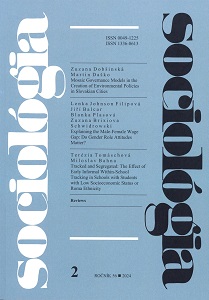Mosaic Governance Models in the Creation of Environmental Policies in Slovakian Cities
Mosaic Governance Models in the Creation of Environmental Policies in Slovakian Cities
Author(s): Zuzana Dobšinská, Martin DaškoSubject(s): Politics, Energy and Environmental Studies, Governance, Management and complex organizations, Policy, planning, forecast and speculation
Published by: SAV - Slovenská akadémia vied - Sociologický ústav
Keywords: Mosaic governance; active citizens; green infrastructure; waste management; local government;
Summary/Abstract: Mosaic governance is a concept used in environmental policy, where the basis is the initiation of topics by the civil sector. Active citizens should contribute to creating environmental policies (specifically green infrastructure and waste management in the presented research). The article aims to analyze active citizenship in local environmental policy initiatives using the concept of mosaic governance. Mosaic governance focuses on exchanging resources, discourses, game plans, and experiences between governments and active citizens. Mosaic governance is mainly applied in Western European cities, where the concept originated. In the Central European area, the investigation of mosaic governance is not so strongly widespread. That is why the article's authors investigated the model mentioned in Slovakia. The paper's primary goal is to show the different forms of civic activism involved in environmental policies in selected cities. Since the Slovak Republic has eight self-governing regions, one city was selected from each. The criteria for selecting cities were realized projects in green infrastructure and waste management, a higher rate of the city's transparency index (according to statistical data), the willingness of local government actors to conduct interviews, and financial subsidies used in environmental projects. Each city uses citizen activism differently when creating environmental policies. The authors conclude that several modified versions of mosaic governance and representation of civic activism exist. The basic model, where citizens are involved based on the initiative of self-governing bodies; the optimal model, where citizen activists directly initiate topics; and the adaptive model, where citizen activists are direct decision-makers.
Journal: Sociológia - Slovak Sociological Review
- Issue Year: 56/2024
- Issue No: 2
- Page Range: 93-119
- Page Count: 27
- Language: English

